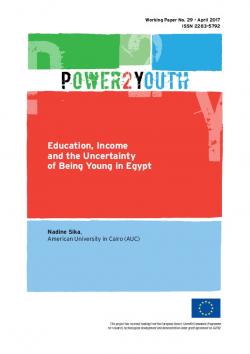Education, Income and the Uncertainty of Being Young in Egypt
This paper analyses the extent to which young people’s background – gender, education and income – influences their life chances. Based on a national sample survey of 1,200 young people conducted in April 2016, the research found that young people in Egypt are not equally excluded or marginalized. The majority of youth are to some extent included in the polity, one way or another, with variances in marginalization. Young people can be perceived as constituting three different categories, with three different levels of marginalization and uncertainty. The first category is the most deprived of all: young uneducated people from poor families who are marginalized in the employment market, and have the lowest income levels. The second category comprises young people who have attained secondary education and whose families typically fall in the mid and low income levels. They have high aspirations for change and are very likely to participate politically through voting and engaging in election campaigns. The level of marginalization of these young people depends on their family income level: the lower the family income the more likely they will be unemployed. Young people with university education, the third category, have the greatest life chances. They are more likely to engage in public life, for instance through civil society organizations or by voting, to promote the political and social change they aspire for. Even though young women have an equal chance of attaining secondary and higher education, their life experiences are different from those of young men, especially with respect to employment and political participation.
Other version: "Neoliberalism, marginalization and the uncertainties of being young: The case of Egypt", in Mediterranean Politics, Vol. 24, No. 5 (2019), p. 545-567, DOI: 10.1080/13629395.2018.1434067.
-
Details
Roma, IAI, April 2017, 20 p. -
Issue
29
Introduction
1. Neoliberalism and Young People’s Life Chances
1.1 Neoliberalism and Regime Policies toward Young People
1.2 Different Economic Backgrounds, Different Experiences
2. Analysis of Survey Data
2.1 Survey and Sample
2.2 Employment and Income Levels
2.3 Education and Its Impact on Employment and Migration
2.4 Education and Employment
2.5 Migration and Employment
2.6 Civic and Political Participation
2.7 Education and Its Impact on Civic and Political Participation
2.8 Gender Equality
2.9 Trust in Formal and Informal Institutions
Conclusion
References
Topic
Tag
Related content
-
Ricerca08/10/2014
POWER2YOUTH - Freedom, dignity and justice
leggi tutto



